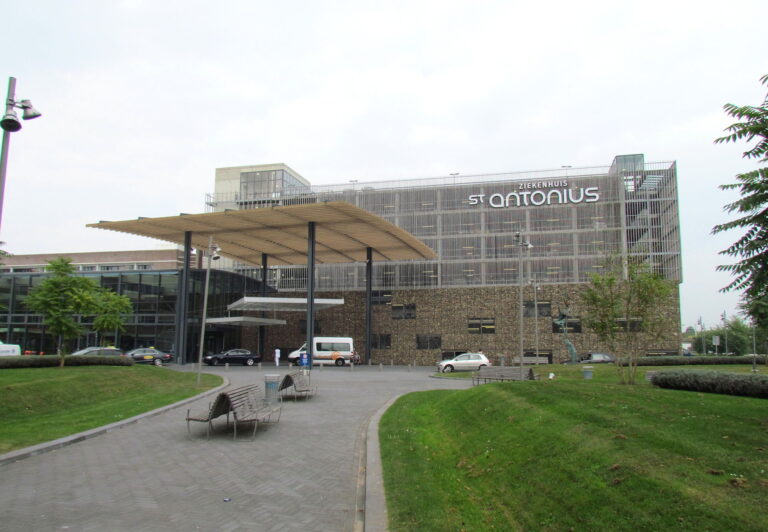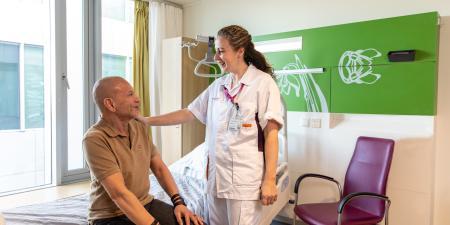ARTEQ realizes digital archiving solution for St. Antonius Hospital

Innovative archiving for the future of health care
The St. Antonius Hospital is a top clinical hospital and the largest non-academic teaching hospital in the Netherlands, with clinical specialties in heart and vascular, lungs, and cancer. St. Antonius provides (highly) complex care at multiple locations. Its main ambition is to provide the best medical and nursing care and service. Well-trained healthcare professionals strive for excellence in their daily work. Over 5,000 employees work towards the hospital’s mission: “Together, caring for quality of life.”
Hospitals handle vast volumes of data. PACS*, EHR/EMR, and various other systems** generate a large amount of data daily in various data types, which places high demands on the storage environment. Additionally, hospitals must comply with legally mandated retention periods and have specific requirements for data availability, stemming from numerous healthcare processes.
As this data pertains to the primary business processes, confidentiality, integrity, and availability are of utmost importance in storage and archiving.
In 2016, the existing archiving solution at St. Antonius Hospital needed replacement. The hospital aimed to transition to a Vendor Neutral Archive solution, where the link to the archive is independent of the applications and equipment in use. Ultimately, the vendor Sectra was selected as the partner for this project.
The existing archiving system, based on an older version of Oracle HSM, integrated well with Sectra. Therefore, the hospital decided to maintain the existing Oracle HSM platform. To prepare for future growth, they sought a solution that could meet their needs in the coming years, and this task was awarded to Arteq.


St. Antonius Hospital: archiving without interruption for infallible care
Jetse Pettinga, Head of ICT Management at St. Antonius Hospital, stated, “We are a research hospital, which means that we used to be required to retain information for a lifetime (initially set at 115 years); however, the legal requirement has now been reduced to 35 years. We view archiving as the counterpart to backup: storing data with specific objectives, including guaranteed availability and complete data integrity. The data we store today must remain exactly the same bit by bit after 35 years.”
For this project, St. Antonius Hospital established several clear principles and objectives. They aimed to ensure that the replacement process does not disrupt hospital activities. Although this involves ‘archive data,’ it must be available at all times (24×7) so that a healthcare provider can access a patient’s history at any time. To achieve this, data is prefetched from the archive, where possible, during the night before an appointment. Additionally, if a patient, for example, arrives at the hospital unexpectedly due to an accident, the archive must be immediately accessible, and historical data should be available.
In the medical sector, the absence of complete information can make the difference between a timely diagnosis and a delayed one. The data in the archive must always be accurate and present.
This solution achieves data redundancy by storing the data in three separate locations: once on a disk subsystem in each of the two data centers and a second time on tape at a third location. Importantly, this process does not use data replication; instead, it creates three individual copies of the original data to prevent data corruption in one data center from being replicated to the other.
Metadata is added to ensure the integrity of the data on disk and tape and is regularly validated and automatically corrected if necessary. The chosen Oracle solution offers extensive capabilities for this purpose.
Another key consideration is the performance of the new system. Due to the multitude of connected applications, Sectra processes a significant amount of data. Performance issues in processing could have a major impact on the hospital’s operations: if the archive cannot be accessed or is accessed slowly, waiting rooms can quickly fill up. The integration between Sectra and the new archive must be seamless to prevent performance bottlenecks.

The seamless transition to an advanced archiving solution
Jetse Pettinga, “We have been collaborating with Arteq for a long time, providing support and maintenance for our previous archiving system. During the replacement, Arteq assisted us in making the right choices, not only in terms of products and solutions but also in configuring the correct setup. We ultimately chose Oracle HSM again because it aligns best with our existing environment, knowledge, and experience.
As a hospital, we cannot do without IT, and our business operates 24/7. This presents practical challenges, such as system maintenance timing. Alongside the essential requirements for availability and performance, this was one of the reasons we opted for a redundant solution spread across three geographical locations.
The project itself was completed in five months through close collaboration, and we achieved all predefined objectives. The new environment was built alongside the existing archive, ensuring no negative impact on our operations or information availability. The transition from the old to the new archive went seamlessly. The minor issues we encountered were more related to how the archive and new features were used, and Arteq supported us in resolving them.”
Jetse Pettinga, “In Arteq, we have a partner with whom we can work on an equal footing and brainstorm to arrive at the best solutions together. I prefer working with relatively small partners, companies with the right focus and expertise. We deliberately entrust parts of our ICT to specialized parties and strongly emphasize quality in doing so.”
Arnoud Dekker, Senior System Administrator at St. Antonius Hospital, “The implementation went really well. The new environment is up and running smoothly. This is the kind of solution where you can proverbially pull the plug, and no one in the hospital would be affected.
With the introduction of Sectra, the number of objects in the archive quickly exceeds 1 billion, and this should not negatively impact performance. We noticed that this was a problem in the old setup, but in the design of the new archive, Arteq anticipated this growth, allowing us to comfortably scale to at least 5 billion objects.
We handle many aspects ourselves and have a lot of in-house expertise, but the combination of software and systems is highly complex. We have an open partnership with Arteq and a great personal connection. However, ultimately, only the result matters for the hospital: it just has to work. I’m pleased that Arteq provides us with the necessary support and knowledge.”
*PACS – Radiographs, MRI scans, etc.
** EHR/EMR data – Patient data, appointments, research data, reports, etc.
Contact:
Do you want to explore how Arteq can assist your organization with advanced storage solutions and seamless management of growing data volumes
Contact us today! Our team is ready to discuss your specific needs and provide tailor-made solutions.
